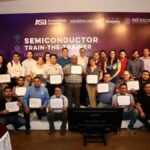Mexico’s ambassador to the US hosts event in DC to announce important step

By Jerry Gonzalez |
October 04, 2023
ShareFacebookTwitterLinkedInEmail
A new online course to teach Mexican engineers English language specific to the semiconductor industry launched Monday at an event hosted by the Embassy of Mexico, held in Washington, D.C., and virtually.
Ambassador Esteban Moctezuma Barragán praised Arizona State University for its role and partnership in helping strengthen North America’s competitiveness in the semiconductor industry.
“Semiconductors is the industry of the future, a high value-added sector with high technological capacity that requires a specialized labor force,” Moctezuma Barragán said. “This course is another deliverable of the memorandum of understanding (MOU) signed between Michael Crow, president of Arizona State University, and the Embassy of Mexico in the U.S. in 2022 in Phoenix, Arizona.”
The English for the Semiconductor Industry course supports MOU objectives to promote workforce development, education and collaboration between ASU and Mexican institutions, both private and public, working in the semiconductor industry.
“This achievement is essential to reach a common goal of sustainable growth, supply chain integration and a more competitive and humanistic North America,” Moctezuma Barragán said. “The (semiconductor) industry faces a risk of shortage of human talent that would limit the pace of innovation in the coming years. Semiconductors are critical for the economy and national security.
“It’s a key input in strategic products and services like 5G, quantum computing, artificial intelligence, autonomous systems, space and hypersonic and cyber security.”
The CHIPS and Science Act, enacted by Congress and signed into law by President Joe Biden in August 2022, seeks to address vulnerabilities in the supply chains, said John Neuffer, president and CEO of the Semiconductor Industry Association.
“The key one is that we don’t manufacture enough chips here,” Neuffer said. “The good news is that our industry has stepped up very aggressively with commitments to invest to the tune of more than $200 billion dollars and something like 60 different sites.
“But that’s only part of the story. The other part is that we can’t do it alone. We need our friends and allies to help make our supply chains less vulnerable, more resilient, and Mexico has a lot going for it.”
The Semiconductor Industry Association represents 99% of U.S. chip manufacturers and about two-thirds of the global semiconductor industry. A recent Semiconductor Industry Association workforce report concluded that by 2030, there will be a shortage of engineers, technicians and computer scientists, Neuffer said.
“It’s not a problem that we just have; it’s a problem that all our friends and allies have, like Mexico,” Neuffer said. “So this program is a really important, concrete step to address ‘the delta’ we have in what our workforce is now, and the workforce we need as our industry moves to rebalance supply chains around the world.”
Mexico’s Undersecretary for Foreign Trade Alejandro Encinas Nájera said Mexico’s talent pool can support the future semiconductor industry. Mexico established a working group with representatives from the Secretary of Education, Secretary of Labor and the National Council of Science and Technology to integrate national efforts and guide citizens toward future opportunities in the industry.
“From our position … we can articulate the needs of the private sector regarding talent, and one of the recurring observations is the command of the English language,” Encinas Nájera said. “That is why I believe today the step we are taking is very important in helping the semiconductor industry develop throughout our country.”
At the national level, the Tecnológico Nacional de Mexico is engaged in promoting the new course during its initial phase, which should be available to students within days, Encinas Nájera said. He expects around 2,700 engineering students to complete the course no later than February 2024.
The idea of the course started after visits to manufacturing companies in Mexico last year, according to Paola Hidalgo, ASU executive director for Mexico relations.
“I talked with HR directors, asking how ASU could help prepare talent,” Hidalgo said. “All of them indicated the need for technical English. I’m thrilled that ASU launched this course today with our Mexican partners. We want to strengthen both our partners’ competitiveness and the learners, helping them be better prepared for professional opportunities that the CHIPS economic revolution offers.”
Once the need was set, ASU’s Global Launch designed the course by assembling a team that included a subject matter expert, an English language teacher, and an instructional designer. To better understand the craft, the team visited an ASU research laboratory that works with new startups and creates microchips, Global Launch Director Diana Lippincott said.
“Our subject matter expert has years of experience running ship fabrication facilities in Taiwan and China,” Lippincott said. “And so we took all these experts, put them together, and came up with this course that we hope will help students in Mexico improve their English and move forward into the new economy with the United States and Mexico.”
The course consists of seven sections: introduction to semiconductors, design, manufacturing, equipment, safety, supply chain, human resources and finance.
Many public and private sector stakeholders and partners are engaged in efforts to turn North America into a global leader in semiconductor production. Some were represented during the course inauguration ceremony, including the Office of Arizona Gov. Katie Hobbs, the Office of the Governor of Sonora Alfonso Durazo, the Arizona-Mexico Commission, Mexico’s Secretaries of the Economy and Public Education, the Instituto Tecnológico Nacional de Mexico, Universidad Autónoma de Baja California, and Universidad Tecmilenio.
“These events are another example of how working together in coordination with relevant stakeholders, governments and academic sectors, we can achieve strategic common goals to create a more competitive region for technology and workforce development,” Moctezuma Barragan said. “Our partnership means sharing challenges and sharing solutions, but more importantly sharing our future.”
Moctezuma Barragan also congratulated ASU for recent achievements, including its ninth consecutive U.S. News and World Report designation as the most innovative university in the country for 2023, and for being selected by the Department of Defense to be one of eight Microelectronics Commons regional innovation hubs in the U.S.
Top photo: Attendees clap after the signing of memorandums of understanding related to the offering of the new English for the Semiconductor Industry course launched Monday, Oct. 2, during a ceremony in the Mexican Embassy in Washington, D.C.
Faculty Business Corporation Tempe campus Washington, D.C. Engineering Policymakers Science and technology International Technology Global Launch Office Of The President Office of University Affairs


